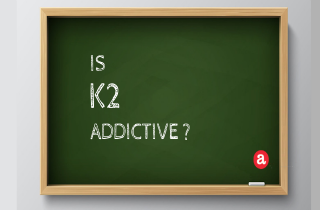YES. K2 (like marijuana) is addictive.
What exactly makes getting addicted to K2/Spice possible? How can you tell if you’re addicted to K2? We’ll review these questions here. And we invite your questions about the addictive potential of K2 at the end.
What is K2 used for?
K2, also known as “Spice”, has no known or approved medical use in the U.S. K2 has been marketed as a “legal” alternative to marijuana. But this is no longer the case since the main ingredients in K2 have been banned in many countries in the world, the U.S. military and across the U.S. The only use for K2 is drug abusers seeking a euphoric “high” like that they would get from marijuana. Using Spice to get high off, however, can cause serious side effects including hallucinations, cardiovascular problems and intense discomfort.
What is K2 made of?
K2 may be labeled as “incense” to try to sneak under the radar of law enforcement. In fact, no one’s actually sure exactly what’s in K2, because it can vary widely from batch to batch. But in general, K2 contains about 3 grams of vegetable matter such as dried leaves, resin, or powder sold in metal-foil sachets to which one or more synthetic cannabinoids are added. Some of the more common synthetic cannabinoids ingredient contained in K2 include:
- AM – 694
- CP – 47,497
- CP – 47,497-C8
- HU-210
- JWH – 015
- JWH – 018
- JWH – 019
- JWH – 073
- JWH – 122
- JWH – 200
- JWH – 250
- JWH – 398
K2 is typically is smoked, but can also be made into a tea. Different batches may contain completely different substances, so it’s hard to say just how safe K2 is to take. In fact, the side effects and dangers are unpredictable and have caused intense hallucinations and cardiovascular effects in reported cases across U.S. emergency rooms. And Spice drug tests 2012 are able to detect many of the chemicals listed above.
How addictive is K2?
It’s hard to say how addictive K2 really is. There’s simply very little research into the drug and the chemicals used in it. But K2 does affects the central nervous system. And there’s some evidence that repeated use can cause users to develop a tolerance to K2.
In addition to creating feelings of euphoria, K2 can provoke withdrawal and a dependence syndromes after chronic consumption. Persistance of drug craving even after K2 is out of the system is also possible, the characteristic symptom of any kind of drug addiction.
Although many may see K2 as a “safer” alternative to marijuana, K2’s observed effects in hospitals and drug treatment programs around the country can be much more powerful and dangerous than marijuana.
- agitation
- hallucinations
- rapid heart rate
- vomiting
How do you get addicted to K2?
You may be addicted to K2 if you need K2 to deal with stress or cope with the world around you. Using K2 frequently or in large amounts can cause addiction. But keep in mind that no one knows exactly how addictive the various substances used in K2 actually are because they have only been created in laboratories in the past couple of decades. In fact, the long-term health effects of synthetic cannabinoids are unknown, since the drug is so new.
Signs of K2 addiction
K2 addiction means that you have a dependence on K2, coupled with a psychological craving for the drug. Other signs of K2 addiction include:
- Continued K2 abuse despite negative consequences.
- Craving K2 and using it compulsively.
- Seeking K2 in order to stimulate the “reward center” of the brain.
K2 addiction potential questions
Do you still have questions about K2 addiction potential? Please leave them here. We are happy to help answer your questions personally and promptly. If we do not know the answer to your particular question, we will refer you to someone who does.









Related Posts